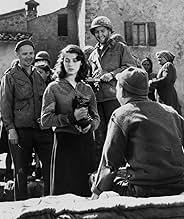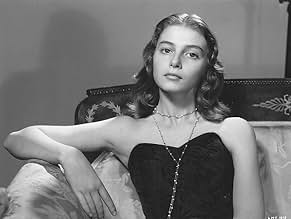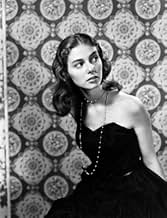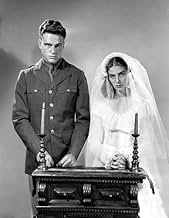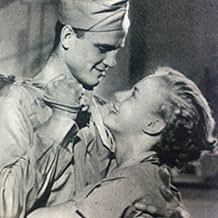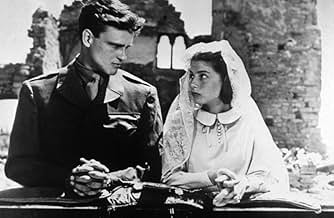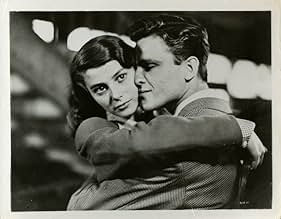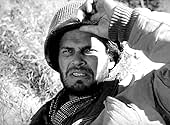A reluctant soldier, Peter, serves in Italy during WWII. He marries a local girl named Teresa and brings her to the US.A reluctant soldier, Peter, serves in Italy during WWII. He marries a local girl named Teresa and brings her to the US.A reluctant soldier, Peter, serves in Italy during WWII. He marries a local girl named Teresa and brings her to the US.
- Nominated for 1 Oscar
- 1 win & 2 nominations total
Lewis E. Ciannelli
- Cheyenne
- (as Lewis Cianelli)
Guido Martufi
- Sergio Russo
- (uncredited)
Featured reviews
Great looking, idiosyncratic movie with a fascinating cast and the kind of painterly imagery that lingers in the memory, but the story is a jumble and unwisely structured around a limp, spineless, infuriating character. There are so many terrific little details on the fringes that so powerfully convey a sense of time and setting (an outdoor wedding on a windy day in a bombed out Italian village, overheard conversations through thin walls on a walk up the steps of a cramped New York apartment building, an exuberant mob of WWII servicemen reuniting with their wide-eyed war brides the moment they step off the boat - sprinting to meet them and gather them up in their arms as each bride's name is called out on a loudspeaker to wild applause) that it's a shame they're attached to such a diffuse storyline.
John Ericson is a revelation (to me, at least) as the smothered, neurotic veteran (with similarities to "REBEL WITHOUT A CAUSE", as others have pointed out). He looks astonishingly like Marlon Brando in many shots, and he IS a good, sensitive actor in the classic brooding mold. His scenes with the angelic Pier Angeli (future love of James Dean) are unusually tender and achingly romantic and he does an excellent job in one agonizing scene where he bombs in an ill-advised effort to make a living as a door to door salesman. The problem isn't really with his performance; it's just that his character is written in such a way that many of his actions don't seem to mesh with what's going on around him. The character loses our respect early with a terrible act of cowardice and seems to possess mild (at best) interest in getting it back. His behavior towards Angeli at one point late in the movie, is impossible to accept, as is the slushy resolution.
Extremely interesting cast if you're a movie buff. There's Ralph Meeker, the actor who replaced Brando in the stage version of "STREETCAR", if I'm not mistaken. There's Angeli and her association to Dean. And then there's Rod Steiger in his film debut, a five or so minute part as a psychiatrist. Not realizing he was in it going in, I was floored to see him turn up here and was certain at first it must just be some other actor who looked like him.
Really good movies just "nail it" somehow. Despite all its strengths, "TERESA" never quite zeroes in on what it's trying to say. It never quite achieves lift-off. Nevertheless, it's well crafted by Fred Zinnemann and parts of it really stick in the mind.
John Ericson is a revelation (to me, at least) as the smothered, neurotic veteran (with similarities to "REBEL WITHOUT A CAUSE", as others have pointed out). He looks astonishingly like Marlon Brando in many shots, and he IS a good, sensitive actor in the classic brooding mold. His scenes with the angelic Pier Angeli (future love of James Dean) are unusually tender and achingly romantic and he does an excellent job in one agonizing scene where he bombs in an ill-advised effort to make a living as a door to door salesman. The problem isn't really with his performance; it's just that his character is written in such a way that many of his actions don't seem to mesh with what's going on around him. The character loses our respect early with a terrible act of cowardice and seems to possess mild (at best) interest in getting it back. His behavior towards Angeli at one point late in the movie, is impossible to accept, as is the slushy resolution.
Extremely interesting cast if you're a movie buff. There's Ralph Meeker, the actor who replaced Brando in the stage version of "STREETCAR", if I'm not mistaken. There's Angeli and her association to Dean. And then there's Rod Steiger in his film debut, a five or so minute part as a psychiatrist. Not realizing he was in it going in, I was floored to see him turn up here and was certain at first it must just be some other actor who looked like him.
Really good movies just "nail it" somehow. Despite all its strengths, "TERESA" never quite zeroes in on what it's trying to say. It never quite achieves lift-off. Nevertheless, it's well crafted by Fred Zinnemann and parts of it really stick in the mind.
This is one depressing movie. So many of the lead characters are unpleasant, it really is difficult to know where to start. Let me begin with the most unpleasant character of all. John Ericson. He began as a Mama's Boy, joined the Army and became a misfit and coward, married and was a lousy husband, and finally walked out on his responsibilities as a father. Throughout the movie he whines, cries, and bitches about his lot in life. One has to wonder, even with the demands of war, how he ever got into the service. In his first encounter with the enemy - he is reduced to a quivering blob crying for his buddy and finally ending up in the loony ward with "battle fatigue".
He gets married to Pier Angeli (more later) in Italy just as the war ends. It baffles me how the Army would ever give permission to a guy like him to marry anyone. Once he rotates and his child-bride joins him at home in New York, we begin to discover what a worm he really is.
His mother dominates him and his father is a total wimp. His sister is a totally unlikable snot. The movie keeps flashing forward to his visit with a mental health pro at the VA. I don't know why. There is nothing they could do for him, although the writers would like you to think so. His problem is his mommy, but he attaches himself to anyone he thinks can prop him up. Aggh, it irritates me just to talk about him.
Pier Angeli, on the other hand, makes this movie. Her performance (at 18 yo) is dazzling. She is beautiful, sensitive, and totally sincere. She is clearly in love with Phillip, and wise enough to understand his problem - even if he won't.
It is, as I said, an unpleasant movie. But it was well shot and, I have to admit, a thoughtful movie. All in all, it was worth watching.
He gets married to Pier Angeli (more later) in Italy just as the war ends. It baffles me how the Army would ever give permission to a guy like him to marry anyone. Once he rotates and his child-bride joins him at home in New York, we begin to discover what a worm he really is.
His mother dominates him and his father is a total wimp. His sister is a totally unlikable snot. The movie keeps flashing forward to his visit with a mental health pro at the VA. I don't know why. There is nothing they could do for him, although the writers would like you to think so. His problem is his mommy, but he attaches himself to anyone he thinks can prop him up. Aggh, it irritates me just to talk about him.
Pier Angeli, on the other hand, makes this movie. Her performance (at 18 yo) is dazzling. She is beautiful, sensitive, and totally sincere. She is clearly in love with Phillip, and wise enough to understand his problem - even if he won't.
It is, as I said, an unpleasant movie. But it was well shot and, I have to admit, a thoughtful movie. All in all, it was worth watching.
Fred Zinnemann's attempt at Neo-Realism is a drab story about a soldier who brings his war bride back to America to live with his disappointment of a father and his overbearing mother. Pier Angeli, as the bride, is lovely, but John Ericson, as the soldier, isn't up to the acting challenge asked of him. Patricia Collinge is decent as his mom, but everyone is done a disservice by Zinnemann's detached direction. I think he was going for understated realism but everything is so understated as to be lacking in any kind of emotional impact whatsoever.
"Teresa" received a 1951 Oscar nomination for Best Motion Picture Story, a category that later was absorbed into the Original Screenplay Oscar.
Grade: C
"Teresa" received a 1951 Oscar nomination for Best Motion Picture Story, a category that later was absorbed into the Original Screenplay Oscar.
Grade: C
This movie launched the feature film debut of four actors that would later go on to reach some success: Pier Angeli, John Ericson, Ralph Meeker, and Rod Steiger. It was also the first of three films for Bill Mauldin, a famous illustrator for "The Stars & Strips" (the military's newspaper during World War II). The only known actors in the movie were Patricia Collinge (The Little Foxes) and Peggy Ann Garner (A Tree Grows in Brooklyn).
The movie begins with Philip Cass (John Ericson) in a session with his VA psychologist, Frank (Rod Steiger), after returning from the war in Italy. He is having trouble fitting in with civilian life.
His story is related to us in flashback— While serving in Italy, Philip is clearly scared and unable to fight the German enemy until Sgt Dobbs (Ralph Meeker) steps in to guide him to fight. During a battle with the Germans, Philip's assignment is to hide in the bushes and let the Germans pass him by and then shoot up a flare for US soldiers to be ready to fight them down steam Unable to do even this, he is sent to a local hospital with battle fatigue. There he learns that Dobbs had been killed in the fight. Filled with guilt and shame, he hides his head in the pillow and cries.
While in Italy, he and a group of US soldiers are assigned to bivouac in an Italian home. There, he meets, dates, and falls in love with a young Italian girl, Teresa (Pier Angeli). They get married and have a honeymoon in Rome. When he ships out for the US, he must leave his war bride behind until she is authorized to join him.
This brings us back to his private battle in the US: He must find a job and make his own home. But, to do this, he must face his possessive mother, Patricia Collinge, and spineless father, Richard Bishop. There are some fine scenes in this movie, especially between, John Ericson and Pier Angeli. However, there is nothing subtle about the story, which "hits us over the head" rather than simply indicating its meaning.
The movie begins with Philip Cass (John Ericson) in a session with his VA psychologist, Frank (Rod Steiger), after returning from the war in Italy. He is having trouble fitting in with civilian life.
His story is related to us in flashback— While serving in Italy, Philip is clearly scared and unable to fight the German enemy until Sgt Dobbs (Ralph Meeker) steps in to guide him to fight. During a battle with the Germans, Philip's assignment is to hide in the bushes and let the Germans pass him by and then shoot up a flare for US soldiers to be ready to fight them down steam Unable to do even this, he is sent to a local hospital with battle fatigue. There he learns that Dobbs had been killed in the fight. Filled with guilt and shame, he hides his head in the pillow and cries.
While in Italy, he and a group of US soldiers are assigned to bivouac in an Italian home. There, he meets, dates, and falls in love with a young Italian girl, Teresa (Pier Angeli). They get married and have a honeymoon in Rome. When he ships out for the US, he must leave his war bride behind until she is authorized to join him.
This brings us back to his private battle in the US: He must find a job and make his own home. But, to do this, he must face his possessive mother, Patricia Collinge, and spineless father, Richard Bishop. There are some fine scenes in this movie, especially between, John Ericson and Pier Angeli. However, there is nothing subtle about the story, which "hits us over the head" rather than simply indicating its meaning.
A movie of note only because it stars a 19 year old Pier Angeli, who plays an Italian girl who meets an American solider (John Ericson) during the war, and marries him shortly thereafter. Angeli is bright-eyed and radiant, and I loved her conversations with her family in Italian, even if they weren't subtitled (maybe even more so because they weren't). Briefly seeing some of the sites in Rome was also nice. Unfortunately, Ericson is not nearly as good as Angeli. His character is admittedly difficult to play and not all that likeable, suffering from panic attacks, lack of confidence, and overall wishy-washiness. I loved how the film is honest in its depiction of war, showing us fear and cowardice, but unfortunately there are no real consequences to it. There are hints at the generation gap of the 1950's, but Ericson is no James Dean. The story telling from director Fred Zinnemann is too segmented and scattered, shifting from war film, to war bride film, to domineering mother film. Patricia Collinge is brilliant as the mom, particularly as we come to understand just how controlling she is, but it's at a point in the film where we just don't see the focus. The ending is also abrupt and unbelievable, as if the filmmakers didn't where to go with it either.
Did you know
- TriviaFilm debut of Rod Steiger.
- GoofsWhen the ambulance backs up to the hospital in front of the church, a set of four studio lights is reflected in its rear windows.
- Quotes
Mrs. Clara Cass, Philip's Mother: [to Philip] You'll never be a salesman, sonny.
- ConnectionsFeatured in The Metro-Goldwyn-Mayer Story (1951)
- How long is Teresa?Powered by Alexa
Details
- Release date
- Country of origin
- Languages
- Also known as
- Die Geschichte einer Braut
- Filming locations
- Scascoli, Loiano, Bologna, Emilia-Romagna, Italy(Italian village scenes)
- Production company
- See more company credits at IMDbPro
- Runtime
- 1h 42m(102 min)
- Color
- Aspect ratio
- 1.37 : 1
Contribute to this page
Suggest an edit or add missing content

